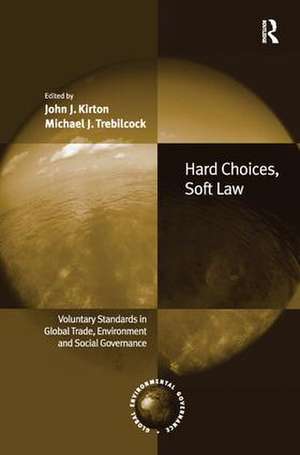Hard Choices, Soft Law: Voluntary Standards in Global Trade, Environment and Social Governance: Global Environmental Governance
Autor John J. Kirton, Michael J. Trebilcocken Limba Engleză Paperback – 28 noi 2016
| Toate formatele și edițiile | Preț | Express |
|---|---|---|
| Paperback (1) | 469.34 lei 6-8 săpt. | |
| Taylor & Francis – 28 noi 2016 | 469.34 lei 6-8 săpt. | |
| Hardback (1) | 1121.01 lei 6-8 săpt. | |
| Taylor & Francis – 28 noi 2004 | 1121.01 lei 6-8 săpt. |
Din seria Global Environmental Governance
- 10%
 Preț: 313.89 lei
Preț: 313.89 lei - 12%
 Preț: 312.43 lei
Preț: 312.43 lei - 15%
 Preț: 703.08 lei
Preț: 703.08 lei -
 Preț: 468.79 lei
Preț: 468.79 lei - 30%
 Preț: 769.55 lei
Preț: 769.55 lei - 18%
 Preț: 1002.63 lei
Preț: 1002.63 lei - 5%
 Preț: 1177.16 lei
Preț: 1177.16 lei - 30%
 Preț: 774.41 lei
Preț: 774.41 lei - 25%
 Preț: 766.66 lei
Preț: 766.66 lei -
 Preț: 449.41 lei
Preț: 449.41 lei - 18%
 Preț: 1002.36 lei
Preț: 1002.36 lei -
 Preț: 469.34 lei
Preț: 469.34 lei -
 Preț: 469.34 lei
Preț: 469.34 lei -
 Preț: 469.34 lei
Preț: 469.34 lei - 13%
 Preț: 338.33 lei
Preț: 338.33 lei - 25%
 Preț: 769.72 lei
Preț: 769.72 lei -
 Preț: 469.34 lei
Preț: 469.34 lei - 30%
 Preț: 855.89 lei
Preț: 855.89 lei -
 Preț: 382.57 lei
Preț: 382.57 lei -
 Preț: 389.66 lei
Preț: 389.66 lei
Preț: 469.34 lei
Nou
Puncte Express: 704
Preț estimativ în valută:
89.82€ • 93.43$ • 74.15£
89.82€ • 93.43$ • 74.15£
Carte tipărită la comandă
Livrare economică 14-28 aprilie
Preluare comenzi: 021 569.72.76
Specificații
ISBN-13: 9781138277397
ISBN-10: 1138277398
Pagini: 392
Dimensiuni: 156 x 234 x 21 mm
Greutate: 0.45 kg
Ediția:1
Editura: Taylor & Francis
Colecția Routledge
Seria Global Environmental Governance
Locul publicării:Oxford, United Kingdom
ISBN-10: 1138277398
Pagini: 392
Dimensiuni: 156 x 234 x 21 mm
Greutate: 0.45 kg
Ediția:1
Editura: Taylor & Francis
Colecția Routledge
Seria Global Environmental Governance
Locul publicării:Oxford, United Kingdom
Cuprins
Contents: Introduction: hard choices and soft law in sustainable global governance, John J. Kirton and Michael J. Trebilcock. Setting Standards for Sustainable Forestry: Nonstate global governance: is forest certification a legitimate alternative to a global forest convention?, Steven Bernstein and Benjamin Cashore; The Forest Stewardship Council: a developing country perspective, Tasso Rezende de Azevedo; Indigenous rights and forest certification in British Columbia, Chris Tollefson. Setting Standards for Labour: Codes of corporate conduct and the labour regulatory state in developing countries, Adelle Blackett; Standard setting at the International Labour Organization: the case of precarious employment, Leah F. Vosko; Hard law or soft law: India and international labour standards, C.S. Venkata Ratnam and Anil Verma; Trade policy and labour standards: objectives, instruments and institutions, Michael J. Trebilcock. Creating Codes of Corporate Responsibility: Corporate social responsibility and the evolution of international norms, Hevina S. Dashwood; The role of nongovernmental organizations and social movements in developing countries, John W. Foster; Multinational corporations, globalization and the challenge of self-regulation, Wesley Cragg; Canadian corporate responsibility in Sudan: why Canada backed down, Robert O. Matthews. International Institutions and Soft Law: The World Trade Organization, the North American Free Trade Agreement and the challenge of sustainable development, Thomas A. Hockin; Integrating environment and labour into the World Trade Organization, Roy MacLaren; The future of the world trading system: beyond Doha, Sylvia Ostry; Enhancing global governance: corporate social responsibility and the international trade and investment framework, Christopher Wilkie; A corporate perspective on globalization, sustainable development and soft law, Michael E. Cloghesy; Terminating agricultural biotechnology? Hard law, voluntary measures and the life sciences industry, Lisa N. Mills; Hard and soft law in international institutions: complements, not alternatives, Nicholas Bayne; Bibliography; Index.
Recenzii
'A central premise of this collection is that informal and voluntary standards can mitigate the deficiencies of formal international law and organizations in several areas including sustainable development and the global environment. The editors refer to these standards as soft law as opposed to hard law (e.g. treaties). The contributors, a first-rate mixture of academics and practitioners and some authors who can be considered both, offer the reader much food for thought on how and when soft law can contribute to regional and global governance...This volume will interest academics and government officials alike.' Jonathan R. Strand, University of Nevada, Las Vegas, USA 'Practitioners might not consider this an immediately relevant book to them, but it represents an important collection of thinking about how the very nature of the law itself is already changing to meet new world patterns. It is not, therefore, a book to be lightly ignored.' Environmental Law & Management '...this is an important collection of essays that deserves to be carefully read by sholars interested in the dynamics of labor and environmental regulations and standards in the global economy.' The Law and Politics Book Review '...the book is structured in an intelligible and innovative way...The main strengths of the book lie in the breadth of case studies presented and in its much-valued interdisciplinary approach. The contributors' expertise and areas of interest offer a truly global approach to the problématique...' Political Studies Review 'This publication has many assets. Firstly, it is fundamentally a good read. Each author presents an insightful, interesting and thought-provoking discussion for their chosen topic...The sections and forming chapters flow well to provide a sense of continuity...The presentation of the Talisman case, perhaps an episode Canada would rather forget, is a valuable contrast and a worthy inclusion in the book.' European Environmental Law Review '...gives a g
Notă biografică
John J. Kirton, Michael J. Trebilcock
Descriere
An important read for academics and policy-makers alike, Hard Choices, Soft Law asserts that voluntary standards, or 'soft' law, are an important supplement to international law in a number of areas.
